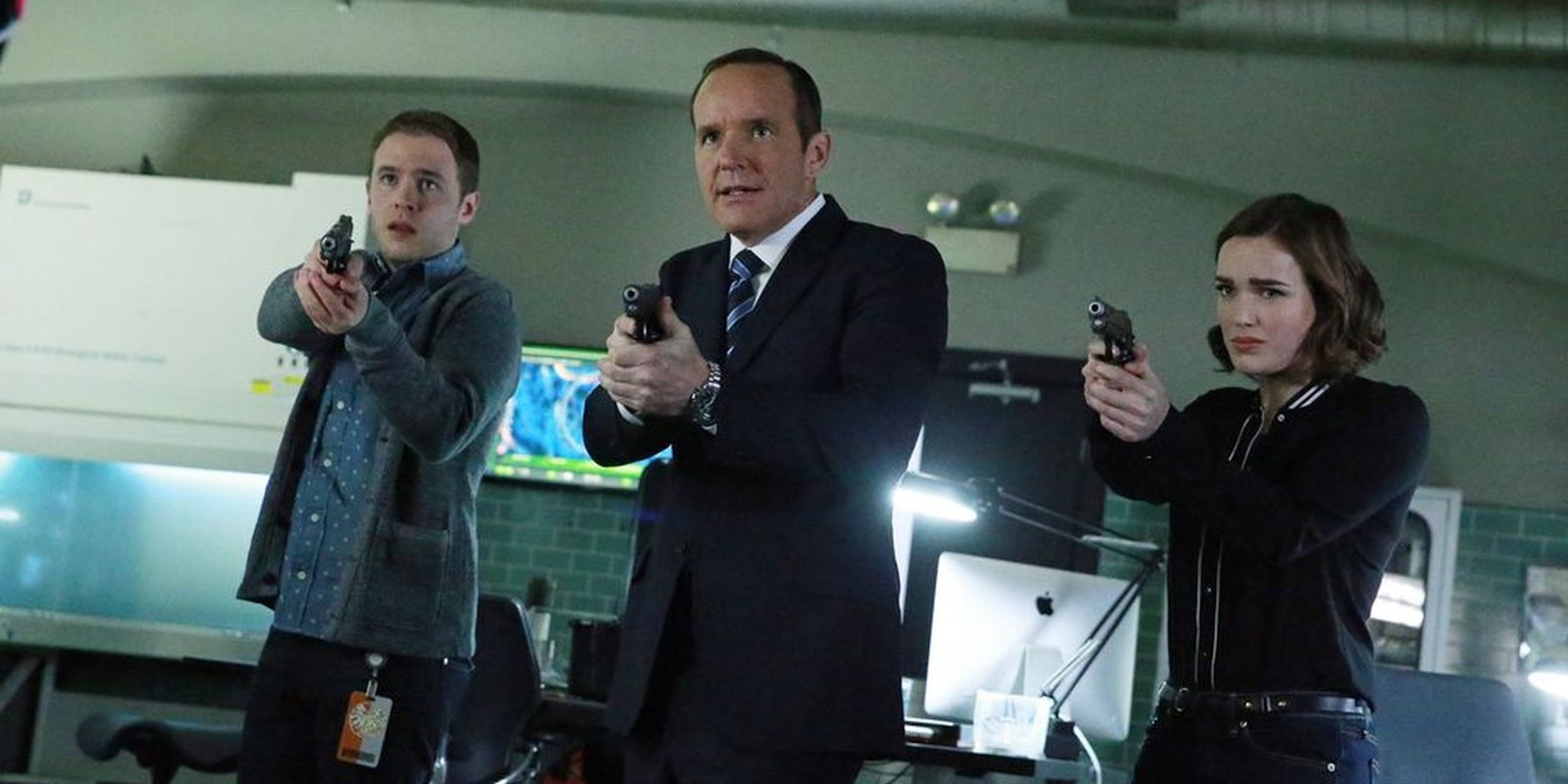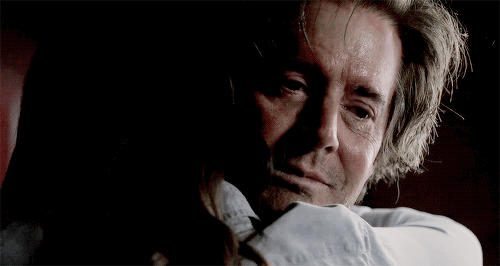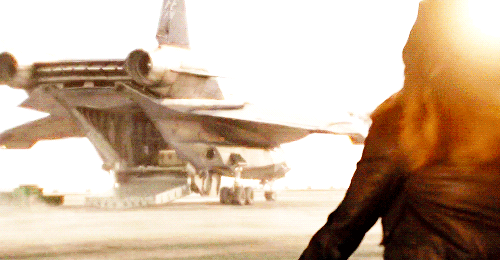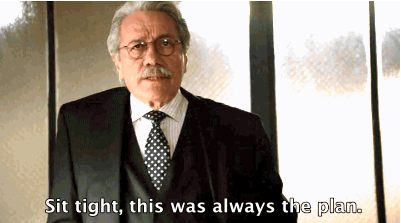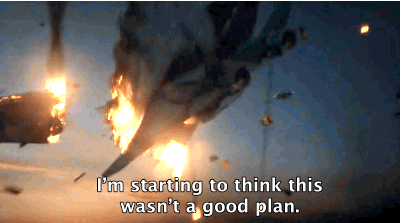Warning: This story contains spoilers for the Agents of S.H.I.E.L.D. season 2 finale.
Against all the odds, Agents of S.H.I.E.L.D.’s chaotic two-part season finale was more coherent than Avengers: Age of Ultron. Not bad for a show with at least five separate factions of characters, all of whom have double-crossed each other at least once in the past few episodes.
Before we get into the the nitty-gritty of what this all means for next season, let’s make one thing abundantly clear: This show is now Skye’s superhero origin story.
It’s hard to believe that at the beginning of season 1, Skye was an unpopular character. Since then she’s gained superpowers and been betrayed by everyone she trusts—and still retains the empathy required to counter the ruthlessness of S.H.I.E.L.D. and the Inhumans. She also found and lost both of her parents, in a storyline of Shakespearean proportions: madness, fanatical loyalty, amnesia, and murder. Goodbye, Kyle McLachlan. Agents of S.H.I.E.L.D. fandom will miss you and your gorilla-testosterone Hulk drugs.
The Inhumans
Although AoS spent months introducing the Inhumans, it was always hard to imagine any Marvel TV characters crossing over into the actual Inhumans movie in 2018. At most, a couple of them would get minor cameos in Captain America: Civil War, to flesh out the superpower registration list. But with Skye getting her own superhero team (possibly the Secret Warriors), it now seems a whole lot more plausible.
Instead of tentatively hinting at the prospect of a human/Inhuman conflict, the finale went full X-Men. Skye’s mother Jiaying revealed her true colors as a Magneto-like militant, and we saw plenty of cool powers on display during a battle sequence across S.H.I.E.L.D.’s aircraft carrier.
Coulson’s team may have come out on top, but it was a hollow victory. Most of the Inhumans still believe S.H.I.E.L.D. attacked their home, and the end of the episode it’s clear that Coulson is already fighting a losing battle. Eventually, the Inhumans will go public.
The more things change…
S.H.I.E.L.D. still hasn’t recovered after the events of Captain America: The Winter Soldier, and it probably never will. That’s why Robert Gonzalez (Edward James Olmos) had to die, because the longer he stayed on the show, the more obvious it was that he was right all along. Coulson is a loose cannon, determined to repeat the mistakes of the past by rebuilding S.H.I.E.L.D. in its old image: secretive, devastatingly powerful, and run by a single figurehead.
Coulson’s decisions are supposedly still being run by a committee of lieutenants like Agent May and Bobbi Morse, but we didn’t see much of this in the finale. Without oversight from the World Security Council or the civilians he wants to protect, Coulson is more like a feudal lord than the director of a government agency.
Just look at his treatment of Skye’s father, who was sent off with a Tahiti mindwipe instead of being imprisoned or standing trial. Coulson’s affection for Skye meant he couldn’t just kill her father in cold blood, so instead he wiped Cal’s memory. This would have been a reasonably non-crazy plan if not for the Tahiti Project’s history, which saw many test subjects turn psychotic. As ever, S.H.I.E.L.D. had merely found a clumsy temporary fix to an unsolvable problem.
#StandWithWard
TV writers often include little nods to their fanbase, and in this episode it was Agent 33’s promise that she would always “stand with Ward.” This is the slogan of a dwindling subset of AoS fandom, Ward’s Warriors, who believe that he’s a sympathetic and redeemable antihero rather than a bloodthirsty psychopath. Actor Clark Gregg once described them as “Charles Manson marriers,” a comparison that later had him jokingly begging for forgiveness on Twitter.
.@WardsWarriors Forgive me. No one thinks Ward is dreamier than I do.
— Clark Gregg (@clarkgregg) January 15, 2015
Even after torturing or betraying pretty much everyone in the main cast, Ward still retains this core of devoted fans. They take him at face value when he says he was warped by his abusive childhood and HYDRA indoctrination, Ward’s perennial excuse for his ever-growing list of crimes. Essentially, Ward’s Warriors believe that his bland undercover persona in season 1 is closer to the “real” Ward than the character we see today—the guy who just kidnapped and tortured Bobbi Morse and took over as head of HYDRA.
Whatever you thought of the finale, I hope everyone’ll continue to #StandWithWard. We have a new season. So let’s see where it goes together
— Brett Dalton (@IMBrettDalton) May 14, 2015
After a full season and a half of Ward manipulating and murdering his way through new and old alliegences, he’s clearly not getting the redemption arc his fans wanted. Agent 33 hammered the final nail into the coffin this week, when she echoed the #StandWithWard slogan just minutes before he shot her in the chest. The only person who still stood with Ward—his brainwashed, semi-amnesiac girlfriend—was now dead by his own hand, albeit accidentally.
With storylines like Skye’s family reunion and Ward’s blood-spattered character arc, Agents of S.H.I.E.L.D. actually tackles more complex emotional journeys than its critically celebrated contemporary, Daredevil. The bad news is that while the AoS showrunners are adept at juggling multiple subplots and keeping their characterization on point, they never get close to truly criticizing the concept of S.H.I.E.L.D. itself.
If we follow the most satisfying course from where season 2 left off, Phil Coulson should become a supervillain who believes he’s a benevolent leader, while Skye flees to lead the Inhumans in a semi-public battle against the authorities. It’s a perfect evolution from their original roles: an idealistic S.H.I.E.L.D. agent unknowingly working for HYDRA, and a rudderless hacktivist with a paranoid distrust of the government.
Photo via Marvel Wikia

